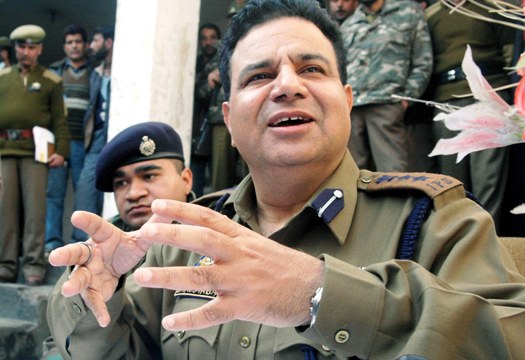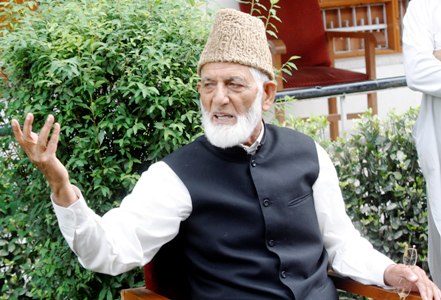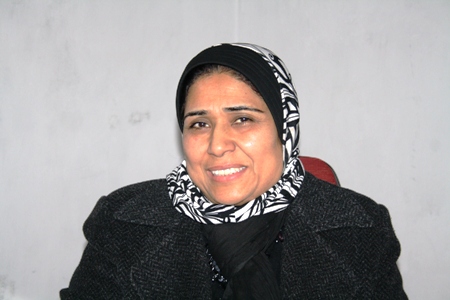
From a society which believed that skies turn red when a murder is committed, Kashmir was made to witness bloodshed for two long decades. While militancy is on decline, common crime is on its way up. Haroon Mirani reports what horrendous crimes reflect about Kashmir society.
A father kills his two-month old son over some discord with wife, car borne Romeos roll over a teenage girl killing her on spot, a son kills his father for refusing him money to spend on girlfriend, a jilted lover stabs, repeatedly, her ladylove to death outside her home. The list goes on and on.
In recent years, while insurgency related incidents have come down in Kashmir, crime has seen a surge. And the nature of crime seems to have grown horrendous. While most of these spine chilling crimes are directed towards women, in many other cases women seem to be the factor.

The recent case of Romana Javaid, a 12th standard student in Srinagar, has dominated the discourse in media and society for some time now. Romana was crushed to death by two youngsters who had been stalking her for some time. They hit her by their car and fled as she fell to death on the spot.
The duo was angry for the girl having rejected their romantic proposal by tearing to pieces a love letter handed by one of the youth. The two followed her in their car, tried to encircle her, and ended up hitting her. The duo was arrested. Police had recovered bits of the torn letter carrying phone number of the accused from the spot.
In another incident, a Kulgam man killed his two month old son after a fight with his wife. The crime was indirectly aimed to hurt the wife.
Shaheena of Kulgam told police that her husband Farooq Ahmad killed their son Omar Farooq when he came to visit her at her paternal house. The husband was arrested and a case has been registered against him.
Last year, Kashmir was stunned when a youth killed a girl by multiple stabs outside her house. The youth, a jilted lover from interior part of Srinagar, was miffed at the proposal of girl’s marriage with some other person. After killing her in broad daylight, he slit his throat too, but survived to end up in jail.

Refusing to take these cases in isolation, sociologists say the problem lies in the society leaning towards materialism with no stress on moral upbringing.
Noted educationist and social science scholar, Prof A G Madhosh, blames the educational curriculum for the delinquencies. He says that the curriculum is bereft of moral education. “In our schools and colleges, there is a need to revive concepts of moral education in our curricula,” says Madhosh.
He also blames parents for not putting a check on activities of their wards. “In this mad race for money and procuring luxuries for children, parents forget their basic responsibility of making their children better citizens first,” he says. “Over a period of time, such children, when left unattended, tend to develop a tendency of violence and prove cancerous for the society.”
Lacunae in police and the judicial system only help to encourage such crimes. Once the fear of law disappears, criminals become more daring. Police is often accused of not arresting criminals or delaying their arrest.
Tabinda Gani rape and murder case of 2007 is a grim reminder of the inefficient judicial setup. Two years into the heinous crime, justice is yet to be delivered.
Romana’s relatives too fear that the case might be marred in judicial and police hurdles. Arrested on May 4, police is yet to file a charge sheet against the accused.
However, Senior Superintendent of Police, Srinagar Afadul Mujtaba disagrees with the notion. “We work according to law and our track record is witness to it,” says Mujtaba. Regarding charge sheet in Romana’s case, he says police will produce it within the stipulated time. Mujtaba also disagrees with the notion that crime rate has increased.
“There has not been any increase in the crimes happening in the state. Actually, it is due to the fact that we are solving more and more such cases and it appears like more are happening,” says Mujtaba.
To tackle the situation and instil confidence in the population, police is taking extra care. “We have increased patrolling and have initiated steps to create awareness about such issues,” says Mujtaba.
He also wants the society to go for introspection and look inwards. “Whatever gruesome crimes are happening, it is done by Kashmiris themselves. Unless we don’t acknowledge that something is wrong with our own society, the situation won’t improve,” he opines.

Secretary State Women’s Commission, Hafiza Muzaffar, however, says that legal laxity is making matters worse. “If the law would have been implemented strictly, it would have acted as a deterrent against such crimes,” says Muzaffar.
“In most of the cases, culprits get free within days as they are declared juvenile or on any other pretext. The society also forgets after some time,” adds Muzaffar. She also calls for imparting moral and religious education in children.
Women activists believe that the society is degrading at a faster rate and women are treated as second class citizens.
Lack of gender empowerment has also been regarded as a factor in rising crimes against women. In a recent report of the Ministry of Child and Women Development and the United Nations Development Programme, Jammu and Kashmir has been placed at bottom of the gender empowerment indices.
Of all the 35 Union Territories/States, Jammu & Kashmir along with Nagaland ranked lowest with a Gender Empowerment Measure of 0.304 till 2006. Even states Bihar, Jharkhand and Orissa at its lowest in 1996 scored 0.329 – better than Jammu and Kashmir. Andhra Pradesh scored the highest from rank 14th of 0.424 in 1996 to rank 1st in 2006 with 0.509.
The report listed out indices of human development, gender-development and G

ender Empowerment Measure (‘GEM’). The scores and ranks reflect the overall performance on human and gender development.
The State Women’s Commission feels that their job of serving women in distress could have been more effective if the commission was included in the ambit of National Women’s Commission (NWC). NWC act clearly states that it includes all the bodies in India except J&K SWC.
“We do not receive the latest training, we can’t participate in their workshops, their programme of mass awareness doesn’t apply to us,” laments Muzaffar.
Even as J&K’s chief ministers have been repeatedly writing to NCW for the inclusion of SCW in their ambit, the calls have not been headed.
The crimes have even forced separatist leaders to raise their voice. At a recent seminar, Mirwaiz Umar said it was painful to see such kind of social evils happening in the valley. “Our heads are down with shame. In the past three months, there have been some twenty suicide cases apart from dowry deaths and shameful incident of youth trampling an innocent girl,” said Mirwaiz.
He called upon parents, teachers and religious preachers to help in stopping the growth of social evils. He called for incorporating Islamic education in the upbringing of children so that they grow as good human beings.
“The society is crumbling and we need a vibrant religio-moral based integrated approach to curb this menace,” Mirwaiz said. “Hurriyat will also be reaching out to the youngsters in schools, colleges and universities to raise moral, religious and political awareness.”
Syed Ali Shah Geelani expressed similar concerns about the growing crime rate in the society.
However, all hope is not yet lost.According to Madhosh, “it is just a behavioural change. If controlled at an early stage by parental, educational and societal intervention, it can be directed towards positive shades and aspects.”















